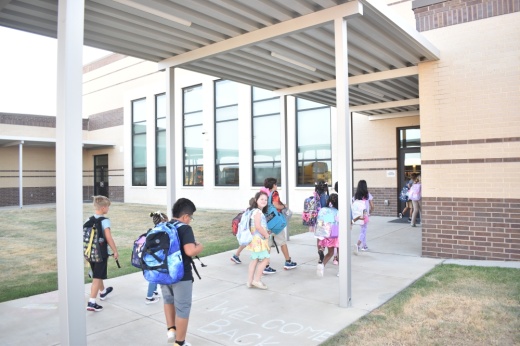Tomball ISD, which adopted its budget June 13, faces an 8% increase in expenses and $5 million shortfall in FY 2023-24, district officials said.
“This is my first [shortfall] budget in my career, and I have been doing this a very long time,” Superintendent Martha Salazar-Zamora said, noting she has 38 years of experience in public education.
Meanwhile, Magnolia ISD is expected to approve its budget Aug. 28. Assistant Superintendent of Operations Erich Morris said the district plans on having a balanced general fund budget and hasn’t had a shortfall since at least 2008.
“It’s important that we live within our means,” Morris said. “We want to do everything that we can to take care of our teachers and our staff, but we also have a responsibility to our taxpayers to make sure that we’re spending wisely and prudently.”The budget season follows the 88th legislative session, which ended in May. The state entered the session with nearly $33 billion in its coffers and a list of funding plans for public schooling. However, larger funding bills have yet to materialize, said Bob Popinski, senior director of policy for Raise Your Hand Texas, a nonprofit education advocacy group.
“It was a session out of balance,” Popinski said. “It was absolutely surprising. ... All the recommendations ended up failing.”
Behind the budgets
TISD Chief Financial Officer Zack Boles attributed the 8% rise in expenses this fiscal year to additional staff, a staff pay raise, and increased safety and security expenses.
In the newly approved budget, spending is increasing 55.63% for security services, 13.02% for curriculum/staff development and 12.27% for instructional leadership, for example.“Really, what you’re seeing with us going into this [shortfall] budget now is the same thing we saw back in 2017-18,” Boles said. “There’s been no increase to the basic allotment, and we’re at a point where the impacts of inflation have really taken a toll and reduced our ability to cover our operational expenses at the same level as it was prior.”
At the same time, TISD’s school board also approved a 4% pay increase for staff, with all teachers seeing at least a $3,500 raise and the first-year teacher salary raised to $60,500.
“It was important that our staff received the increase that each and every one of them wholeheartedly deserved, even if we were not given the additional dollars that I think could and should have been given at the state level,” Salazar-Zamora said.
Boles said TISD will use its general fund balance—essentially the district’s savings account—to cover the FY 2023-24 shortfall.
Meanwhile, MISD’s proposed FY 2023-24 budget is expected to be balanced, with general fund expenditures and revenues proposed at $134.18 million, according to an Aug. 14 budget workshop. The district is also proposing a tax rate of $0.9638 per $100 valuation, which is an 18-cent decrease from FY 2022-23.
MISD is proposing spending increases of 54.2% for instructional leadership, 14.9% for general administration, and 11.7% for security and monitoring services year over year.
As such, MISD administration recommended freezing salaries and considering reaching into reserves for a one-time stipend, according to a presentation Aug. 14. Different pay scenarios could include adopting a new compensation plan when funding is clearer or paying a one-time $500 stipend Oct. 15.
“I’m confident that we will be able to do something,” Morris said. “I just don’t know what that something looks like at this point.”
School funding concerns
One of TISD’s biggest concerns is the basic allotment, Boles said. The per-student allotment is $6,160 and has not been increased since 2019, Popinski said. The state would need to add roughly $1,000 this year to the allotment to match inflation.“It’s overdue ... and really needed to address the increased cost that all districts across the state have faced due to inflation,” Boles said.
State Rep. Sam Harless, R-Spring, said he’d like to see an increase in the basic allotment, but actually raising it could be difficult to achieve.
“The basic allotment should be increased, but you [have] to remember that education and human health and human resources consists of 70% of the state’s budget, so it’s hard to,” Harless said.
TISD is also a fast-growth district, said Salazar-Zamora, who serves as board president for the Fast-Growth School Coalition. The coalition defines fast-growth as at least 10% enrollment growth or an increase of 3,500 or more students in five years.
“There are additional needs that come with [being a fast-growth district], such as facility needs, and not just facilities, but materials and staffing concerns,” Salazar-Zamora said.
Morris also said he’d like to see the Texas Legislature address teacher pay so MISD can adopt a new compensation plan that would further address teacher pay, close pay gaps, and reward veteran teachers and MISD loyalty.
“That’s our hope,” Morris said. “We’re sort of at their mercy at this point.”Looking at the Legislature
During the regular 88th legislative session, many funding bills failed because of efforts to tie them to a private school voucher program as part of Gov. Greg Abbott’s goal to make private institutions more affordable to families in Texas, Popinski said.
For example, House Bill 100, authored by Rep. Ken King, R-Canadian, would have raised the minimum salaries for public school employees; boosted the amount of money schools receive from the state; and increased funding for certain programs, such as bilingual and early education classes.
“It was very disheartening to see that public education was not made a priority at all,” Salazar-Zamora said.
Lawmakers are expected to discuss teacher pay raises, school funding and school choice—or using state funds to send students to private schools—during a third special session in October, Community Impact previously reported.
“We just have to refile [HB 100] and get it passed again, plainly without a bunch of amendments,” Harless said. “So the increased funding will be there. I think there’s going to be some teacher pay raised in there also.”
Salazar-Zamora said she believes it’s important people stay engaged and informed about school funding.
“We want to re-engage everybody so that they remember that the success of a community very much goes in tandem with the success of a school district,” she said.
Cassandra Jenkins, Emily Lincke, Peyton MacKenzie and Hannah Norton contributed to this report.






